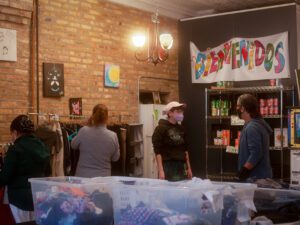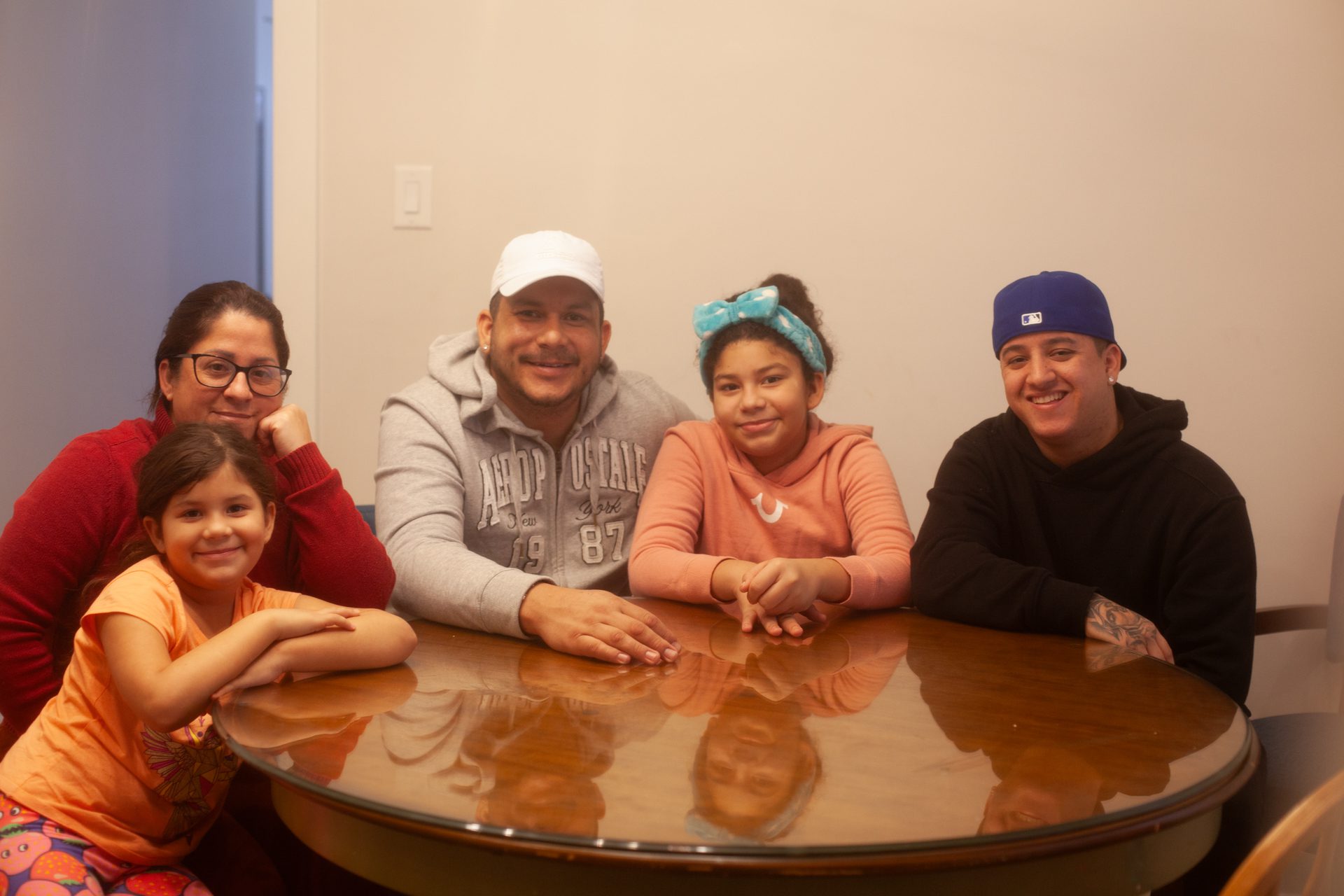 Samantha Friend Cabrera for Borderless Magazine
Samantha Friend Cabrera for Borderless MagazineChicago shelters house over 15,000 migrants. With eviction notices incoming, Oak Park and local volunteers are looking for solutions.
A dim light shines through the frost-tinged dining room windows of the Marquez family’s home in suburban Forest Park. Inside, the bustle of voices envelops the room as the full house prepares to eat their dinner of pepitos — a popular Venezuelan street food.
Want to receive stories like this in your inbox every week?
Sign up for our free newsletter.

After moving in a week earlier, the Marquezes, who arrived in Chicago from Venezuela last fall, gathered in the sparsely furnished dining room. Jose Marquez, his wife Milagros, their three daughters, and Milagros’ sister and nephews found space to enjoy their home-cooked meal — sitting on windowsills, an inflatable mattress and neon children’s chairs.
While barriers to navigating their new life in the United States loom over their heads, the home offers the family hope in the face of much uncertainty.
“When I walked in, I was so surprised,” said Meison Barraez, Jose Marquez’s 24-year-old nephew. “I wasn’t expecting something so beautiful.”
With the help of volunteers in suburban Oak Park, the Marquez family moved into a four-bedroom rental home in mid-January after living in shelters since October. The support is part of a grassroots movement growing throughout the city and state to help find long-term housing for migrant families arriving in Chicago.
But resettlement is an uphill challenge, especially amid imminent shelter evictions.
More than 34,000 migrants have been bused or flown into Chicago from Texas and other Southern border states since August 2022. Volunteers have stepped up in Oak Park and Chicago as city officials have struggled to house the influx of migrants. Some community members have opened their own homes, fundraised for rental assistance and donated furniture and other necessities to help migrants move out of shelters.
For the Marquezes, their new home represents the first step at building a life in the U.S. and putting life in shelters behind them.
“We didn’t have good food at the hotel,” Milagros said in Spanish, reflecting on their time at the Oak Park hotel-turned-shelter. “The girls didn’t eat it. It was a struggle for us to eat it.”
“At least the girls are happy because they feel at home,” she said of their current living situation.
The home offers privacy and the ability to stay rooted in their culture by cooking meals like Venezuelan pepitos or empanadas.
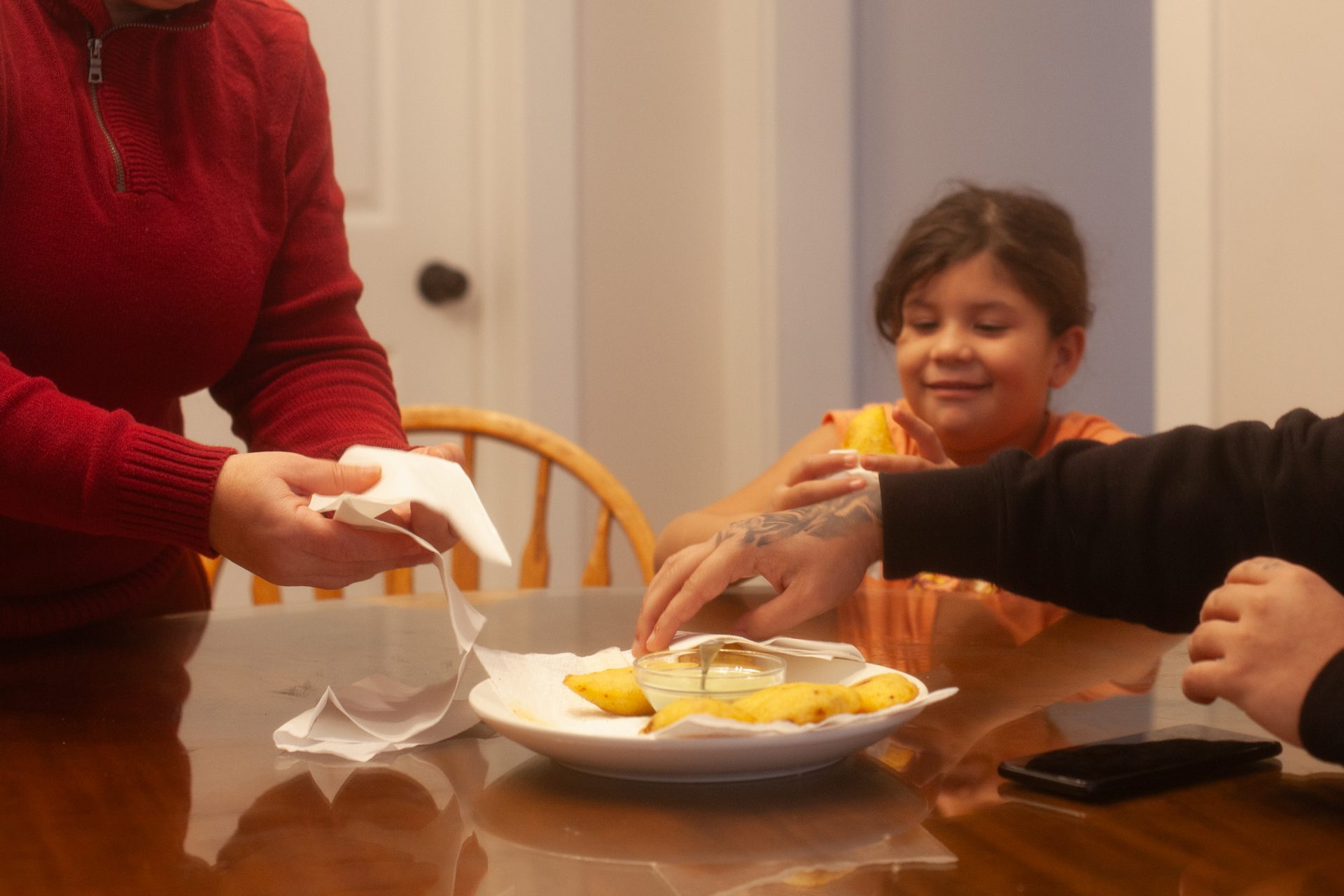
“Some of us sit down here to eat, some go to a room to eat,” Barraez said. “But the thing is that we’re always talking, and we’re always together.”
Housing barriers for migrants: “Everything is difficult”
Despite the immense need for affordable, long-term housing for migrants, Chicago and Oak Park recently introduced restrictions on shelter stays. In November, Chicago announced it would limit migrants to 60 days at city-run shelters. Mayor Brandon Johnson also said the city would not open any new shelters. Meanwhile, Oak Park officials will close its two shelters by the end of February.
These decisions will force migrants — almost none of whom can work legally — to find alternative housing quickly without funds to pay for it. The median rent in Chicago for a two-bedroom apartment in January was just over $1,600, according to Apartment List.
A family would need a monthly income of $3,700 to afford that priced apartment, according to Zillow’s Rent Affordability Calculator.
In December 2022, the Illinois Department of Human Services (IDHS) implemented an Emergency Rental Assistance Program (ASERAP) for asylum seekers. The program initially provided migrants up to six months of rental assistance if they could secure a lease. As of Jan. 29, about 4,700 people moved out of the city’s shelters with assistance from the state program, according to the Illinois Department of Human Services.
Caseworkers at the city’s shelters were tasked with informing migrants of the rental assistance program to connect them with housing. Still, with a shortage of caseworkers and about 15,000 migrants in shelters, some families have fallen through the cracks.
“It wasn’t until just [late January] that there’s now [resettlement case management] support in every single one of [Chicago’s] shelters,” said Beatriz Ponce De León, Deputy Mayor for Immigrant, Migrant and Refugee Rights, during Chicago’s immigration committee meeting at the end of January. “Our shelters grew at a pace that was too fast for the outmigration support…to keep up with.”
Read More of Our Coverage
For those who have secured emergency rental assistance, it is unclear how many of these families were able to stay in their apartments after state funding ran out.
Without the help of local volunteers, migrants face the impossible task of starting a life in the city as federal backlogs delay work permits for new arrivals.
“Everything is difficult,” Barraez said. “Getting a job, getting a house. Every single thing is difficult because you’re an immigrant.”
Informal mutual aid groups help migrants find homes
Chicagoans have used Facebook groups such as Chi Welcome and Refugee Community Connection to provide new arrivals with housing options, resources and support throughout the city. Many have opened their homes to temporarily house migrants, while others offer donations of necessities such as towels, clothing and winter supplies.
When they first arrived, the Marquezes stayed at Chicago’s District 15 police station, a short distance from Oak Park’s town hall center. Oak Park volunteers stepped in to help the Marquezes and other families move out of the police station and into an Oak Park shelter.
“Oak Park and areas like Forest Park…are really nice places to live,” Jose Marquez said. “It’s very calm here, and there are a lot of opportunities to live in a dignified way.”
In recent weeks, the Marquezes’ living room has slowly come to life with the help of volunteers who donated a couch, cabinets, dining room chairs and a television for the house. Oak Park resident and teacher Mika Yamamoto is among several volunteers helping support migrants like the Marquezes. She loaned furniture to the Marquezes from a family home.
In addition to those supporting the Marquez family, a small group of Oak Park volunteers recently launched the “Oak Park Community Migrant Resettlement Mission,” an informal task force and mutual aid effort to help migrants resettle in the United States and find long-term housing solutions outside shelters.
Maya Puentes is part of the group of nine core members and dozens of other volunteers from the village. They’ve helped with food distribution, gathering donations and fundraising to support migrants.
Puentes, a grandchild of Mexican immigrants, was determined to use her skills as a realtor to help people find housing as roughly 140 migrants arrived at Oak Park shelters.
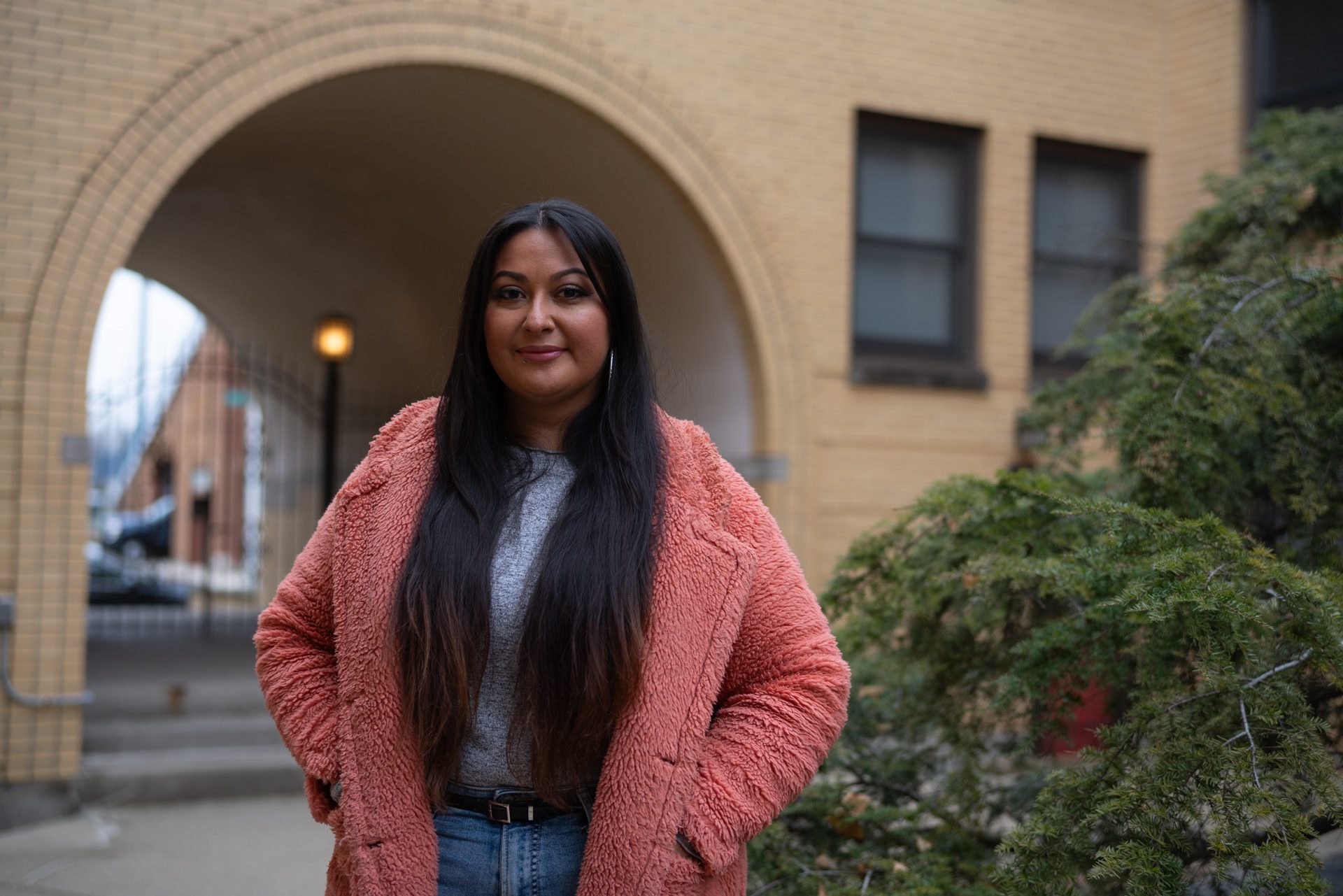
“Until you are really in your own space and feel like you can call something home, you don’t feel settled,” Puentes said. “So, how can you truly start to get out of survival mode?”
Oak Park volunteer Betty Alzamora, a first-generation Venezuelan immigrant, believes legal services, housing, and mutual aid support to migrants are essential to giving immigrants a fighting chance to get their lives started in the U.S.
“As volunteers, as organizers and as activists, the intent here has always been trying to help people find dignified shelter and gain access to services that are legitimate asks for anybody who is coming seeking asylum in this country,” Alzamora said.
The Oak Park Migrant Resettlement Mission, similar to the volunteers that helped the Marquez family, is trying to help resettle other migrants from Oak Park shelters. They aim to fundraise for up to a year’s rent for each family they help resettle. But it can be challenging to find affordable housing in Chicago and surrounding areas, Puentes said.
Last fall, IDHS closed its rental assistance program to migrants arriving in shelters after Nov. 16, 2023, and capped financial aid to three months of rent. This decision came alongside Chicago Mayor Brandon Johnson’s announcement to implement a 60-day shelter-stay policy in mid-November. The change in policies has made the path to finding housing even more difficult.
“With a lot of government entities, there’s just more bureaucracy,” Puentes said. “There’s always more red tape and hoops and all those other things that happen through official channels that just make it harder to get things done sometimes.”
Volunteers have high hopes of getting families into more permanent housing
Oak Park volunteers have high expectations for their mutual aid resettlement efforts. They aim to resettle roughly 140 migrants before the village of Oak Park closes its two shelters at the end of February.
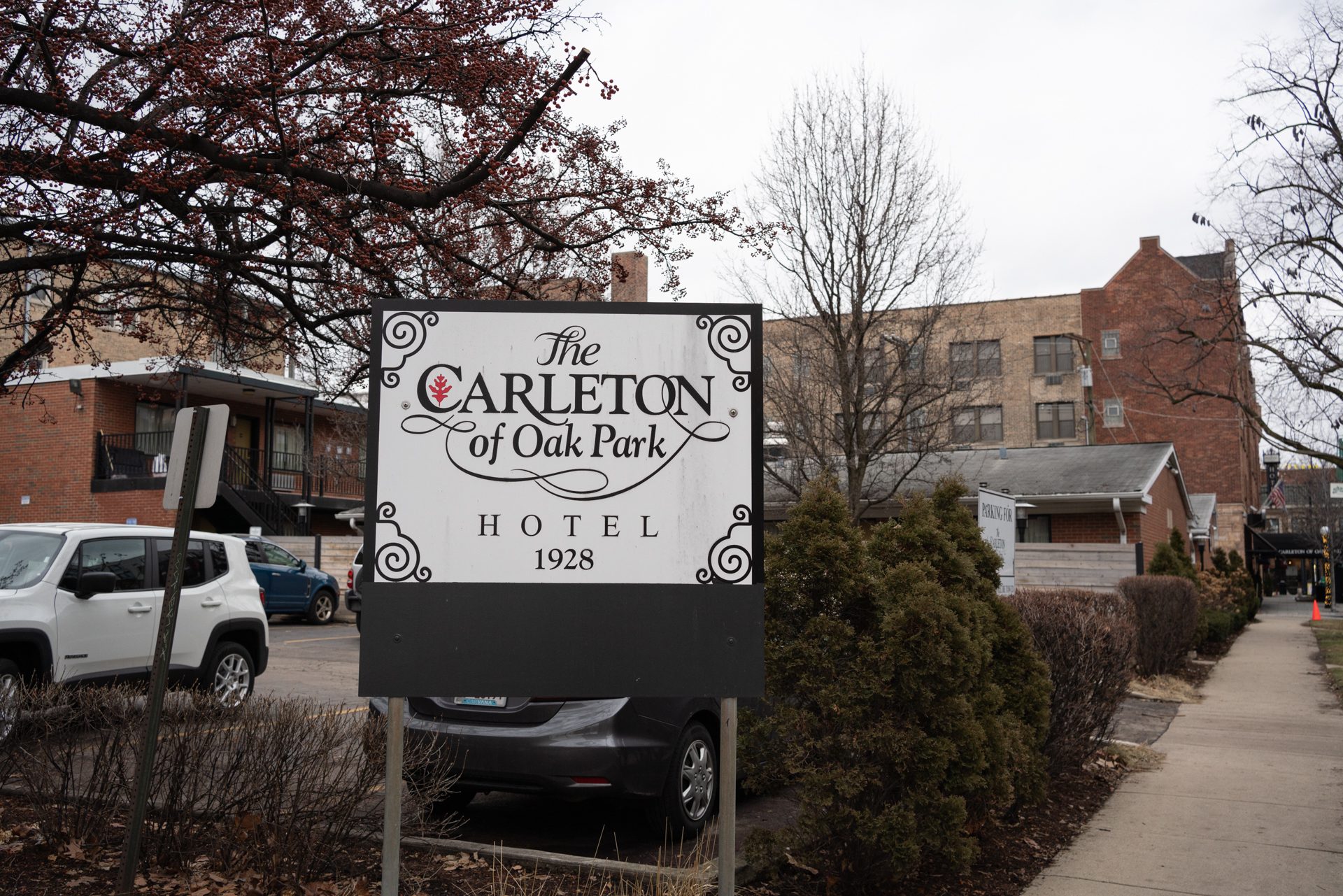
However, the grassroots effort is limited.
So far, the volunteers have resettled four families and located housing for three others preparing to move into their new homes. The Oak Park Migrant Resettlement Mission is continuing to find more potential housing options for migrants.
“It seems overwhelming, and it is a lot,” Puentes said. “But I have to believe that it’s possible. I won’t let myself believe anything else at this point.”
Alzamora and Puentes emphasized that community efforts and collaboration are vital to move forward. They hope to collaborate with other suburbs to continue working toward finding solutions to the current housing crisis.
Any step forward, even a little one, can make a world of difference, Puentes added.
“Poco a poco, little by little,” Puentes said. “I’m just going to take what’s in front of me and do the best that I can with that.”
While volunteers work to raise rental funds for other families, the Marquezes are trying to get their work permits. Without them, they will likely be unable to pay rent in the new home long-term. One month’s rent in the house is $3,300, and that doesn’t include costs like utilities and furniture. For now, volunteers helped the Marquezes pay for the home’s deposit and the first month of rent.
The Marquez family has been grateful for the support they’ve received from volunteers, like Yamamoto, who helped them furnish and pay for their house. But they worry about the short time they have before they have to start paying rent, especially because they still need federal work permits to establish a stable income.
“A month to find stability? That is impossible,” Milagros said. “When you are an immigrant, much more if you have no family, you have no one here, it is even more impossible.”
Months of federal backlogs and barriers to applying for Temporary Protected Status and asylum have made it difficult for the Marquezes and thousands of other migrant families to secure work permits and deportation protections.
The family wants to apply for asylum and is looking for an immigration lawyer to help them. But for now, the house is a start.
“In this house, there is a lot of talent,” Jose Marquez said. “But we just need to have the opportunity to work.”
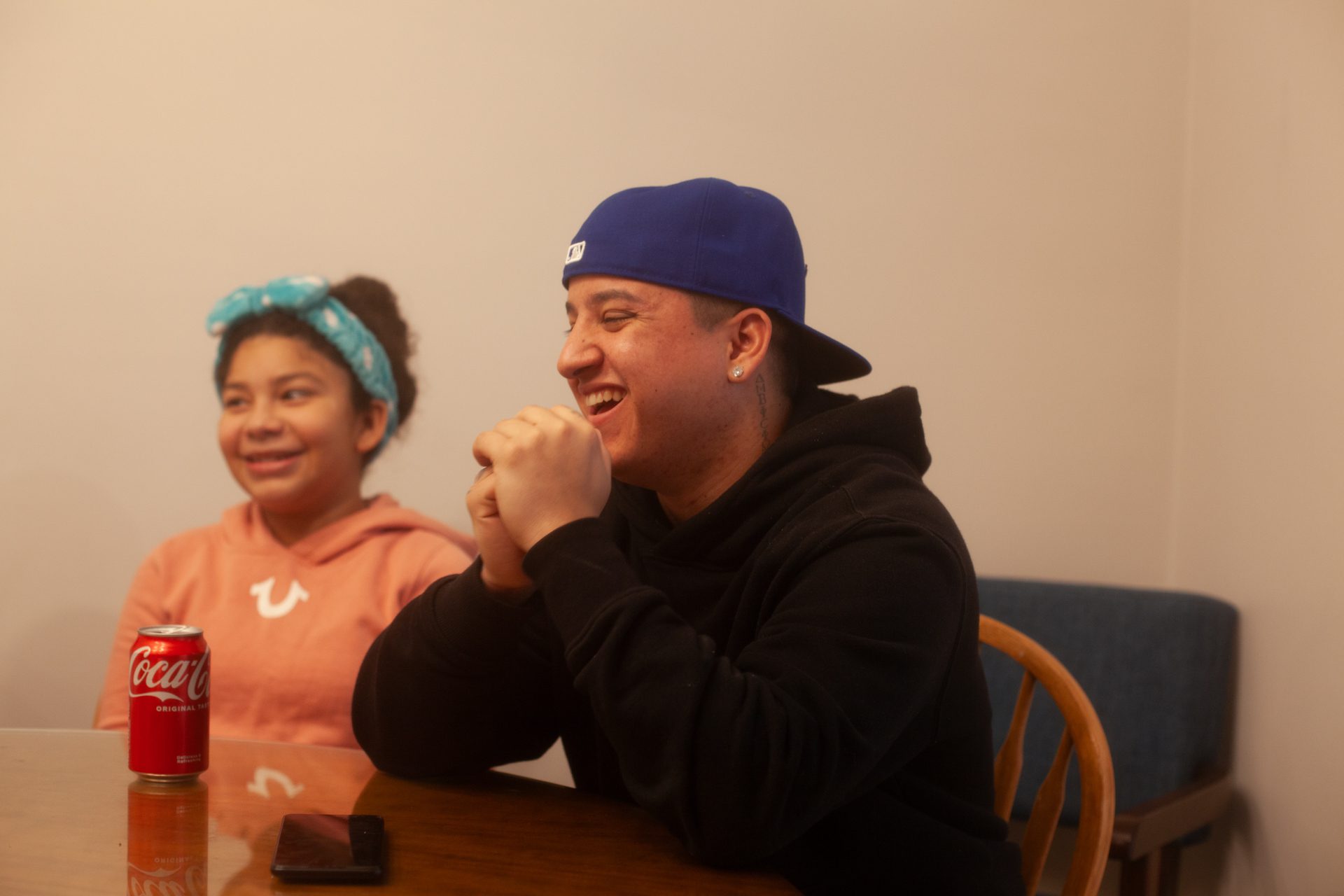

Bring power to immigrant voices!
Our work is made possible thanks to donations from people like you. Support high-quality reporting by making a tax-deductible donation today.

